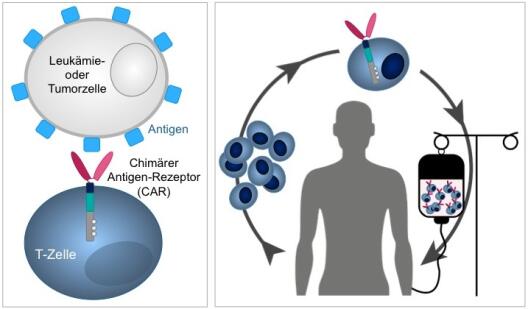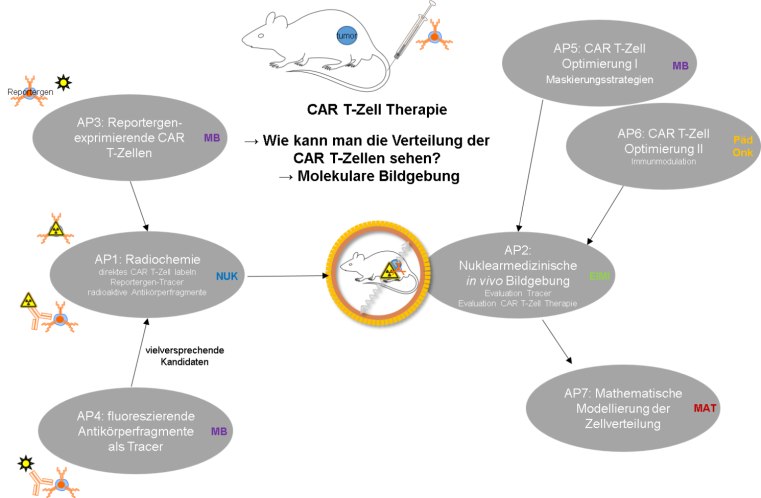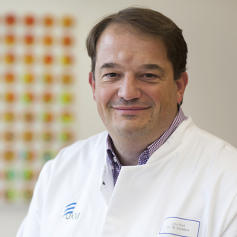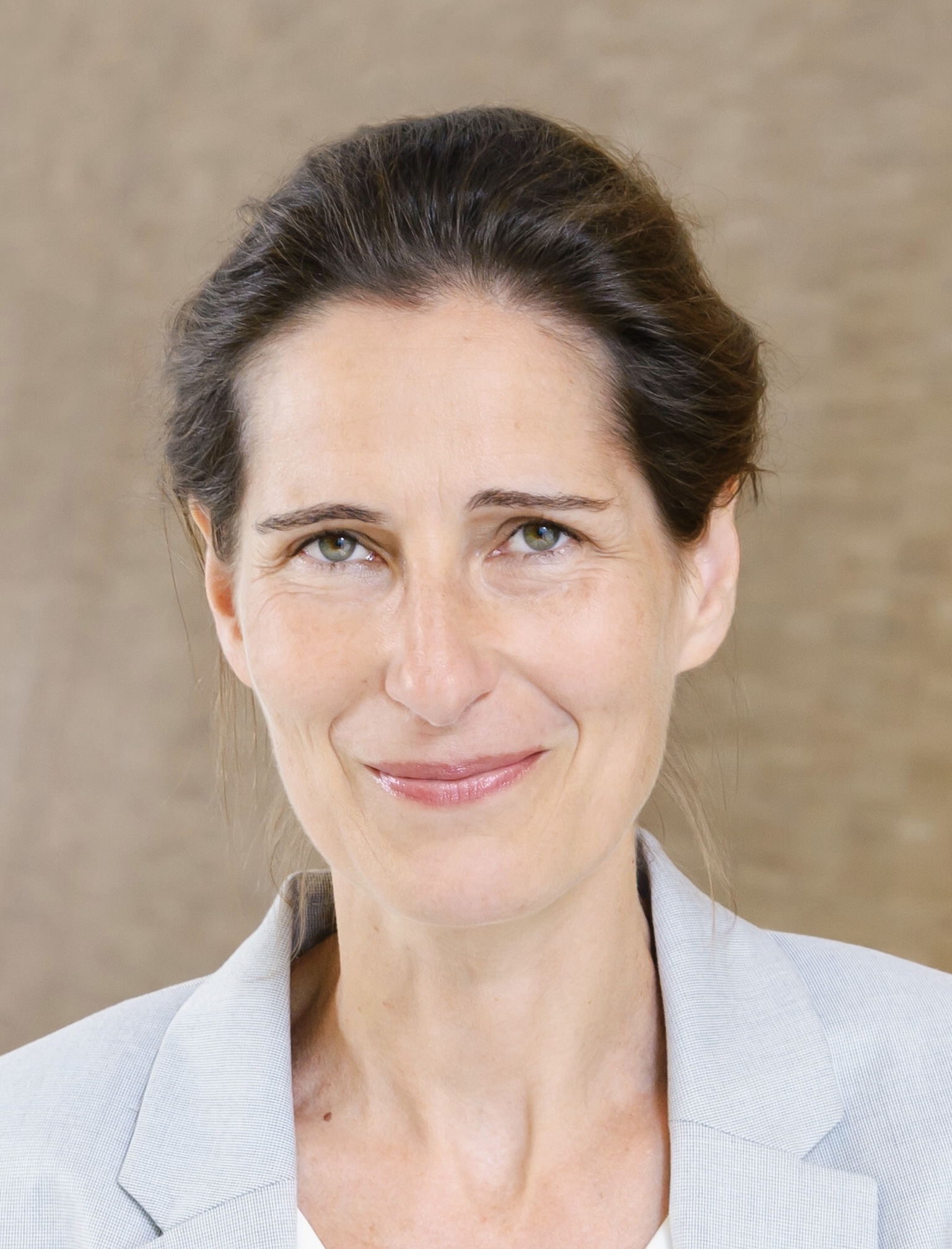



Cancer treatments, such as radiation therapy or chemotherapy, often give unsatisfactory results, such that there is an urgent need for new therapy strategies. Immunotherapy makes use of the body's own immune system to recognize and fight cancer cells. To this end, immune cells (T-cells) are gathered from the patient and genetically modified to enable recoginition of cancer cells. These modified "CAR T-cells" are expanded and returned to the patient (transfused).
There are two research directions with respect to T-cell therapies:
- Specificity: The CAR T-cells can recognize certain features (antigens) of tumor cells. However, some of these antigens also occur in healthy cells, which are then also attacked by the CAR T-cells. This can lead to undesired side effects. To prevent this, more specific antigens need to be found or methods have to be researched which can achieve a more specific activation of CAR T-cells. For example, one idea is to combine multiple antigens.
- Solid tumors: While CAR T-cell therapies have shown promising results for leukemia (blood cancer), they have until now been less effective against solid tumors. The reason is suspected to lie in the microenvironment of solid tumors, where various barriers can prevent the effective infiltration by immune cells.
Until now, the distribution and activity of the transfused cells in the body and in the tumor are not well understood.
The aim of this project is to observe CAR T-cells in the body using non-invasive imaging modalities such as PET/SPECT. For this purpose, we will use a tumor model in mice. CAR T-cells will be labelled with radioactive tracers and their distribution and activity will be followed in the body of the mouse.
Work Packages

© TraCAR Mathematical Strategy
The imaging and reconstruction of cell populations over longer time periods via nuclear medical methods is difficult due to low signal at strong cell dilution or low cell activation (e.g. CAR T-cells in a solid tumor) and fast cell movement compared to the imaging frequency. In one work package, we want to track the movement of cells with mathematical image reconstruction and quantify it using mathematical modelling. In the literature, there are several mathematical models for the movement of cells in various environments. Since the underlying parameters and biological mechanisms are not fully known, these models need to be supplemented by data-driven components. This includes the preparation and mathematical reconstruction of the recorded CAR T-cell distributions, the inverse problem of parameter identification in cell movement models as well as the statistical analysis of cell distributions and tumor geometries.
For the mathematical reconstruction, we will develop an optimal transport regularization based on the fact that short movement paths which match the measured data are most likely. We will combine this approach with models for cell movement in tissue, which will make it possible to solve even challenging reconstruction tasks for the CAR T-cells. Furthermore, we will extend these methods to be able to track different cell populations simultaneously, even though they cannot be distinguished in, for example, a PET image. For this purpose, we will combine PET reconstruction with SPECT images (not necessarily taken at the same time), in which different cells (e.g., CAR T-cells and activated CAR T cells or even tumor cells) can be labelled with different radioisotopes and thus differentiated. Finally, we will create simple models for cell movement and activation in solid tumors, whose parameters we will fit to our measurements in order to quantify the behavior of different CAR T-cells.
Project Partners
 |
|
Miltenyi BiotecMiltenyi Biotec is a global biotechnology and biomedicine company headquartered near Cologne in Bergisch Gladbach, Germany. The company is a provider of products and services that support scientists, clinical researchers, and physicians across basic research, translational research, and clinical applications. |
Project lead: |
 |
|
European Institute for Molecular Imaging (EIMI)The EIMI is one of Germany's leading institutes for preclinical small animal imaging. EIMI's interdisciplinary team develops imaging methods allowing to visualize molecular processes inside organisms, tissues and cells. |
Project lead: |
 |
|
Clinic for Nuclear Medicine at UKMThe Clinic for Nuclear Medicine offers diagnostics through various nuclear medicine imaging modalities, routinely prepares tracers for clinical imaging and is experienced in the development of new radio-pharmaceuticals. In the field of new molecular imaging and therapy methods, their involvement spans from fundamental to clinically applied research. |
Project lead: |
 |
|
Clinic for Paediatric and Adolescent Medicine - Paediatric Haematology and Oncology at UKMThe clinic led by Prof. Dr. Claudia Rössig is one of Germany's largest centers for paediatric oncology and haematology. It is specialized in the treatment of blood and tumor diseases during childhood and adolescence. Prof. Dr. Rössig is also head of the group Cellular Tumor Immunotherapy, which is one of the first groups in Germany to develop CAR T-cell strategies against cancer. |
Project lead: |
This project won the lead market competition LifeSciences.NRW and is being funded by the European Regional Development Fund (ERDF).




